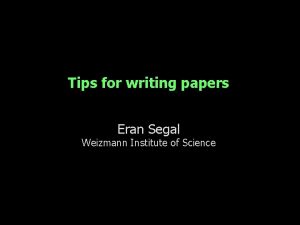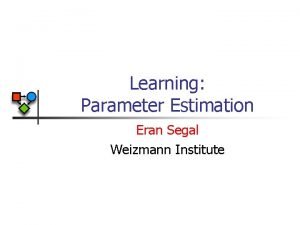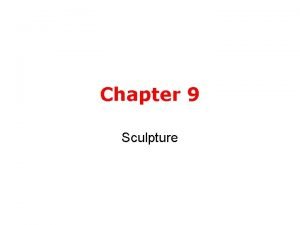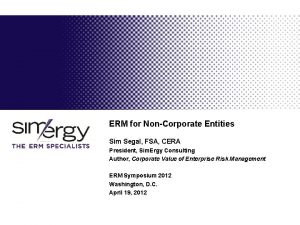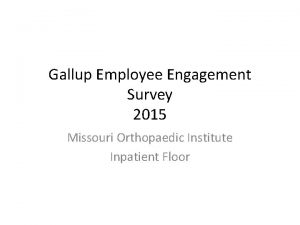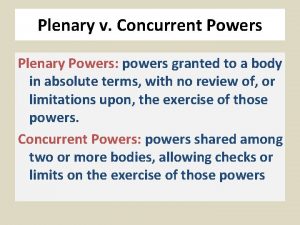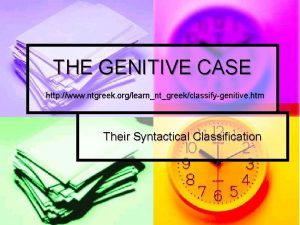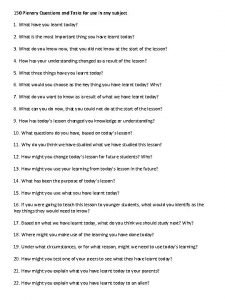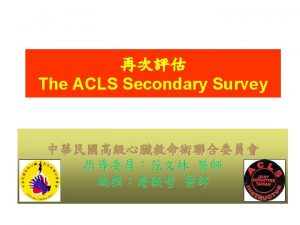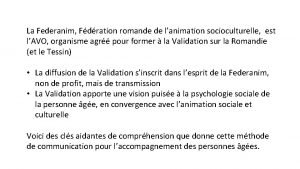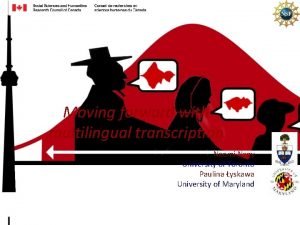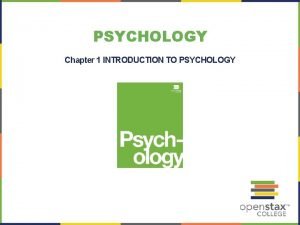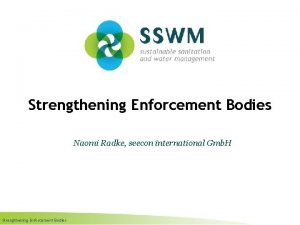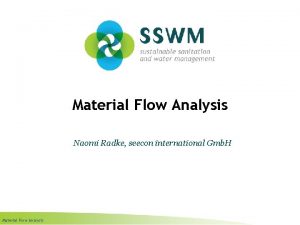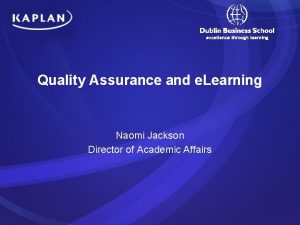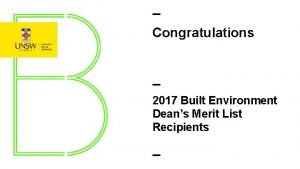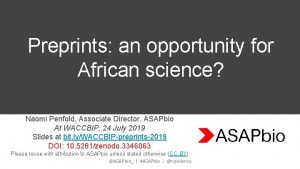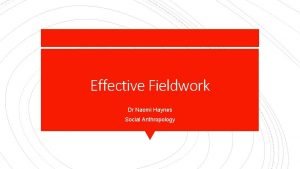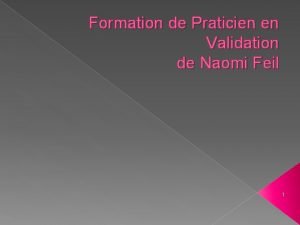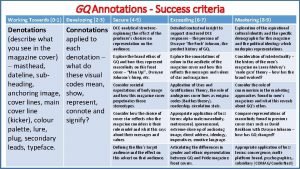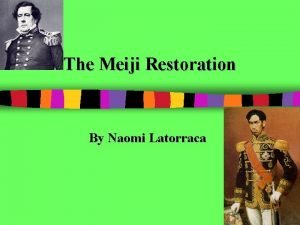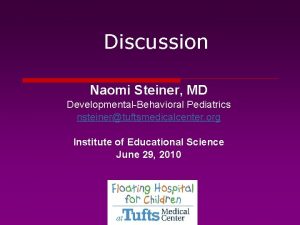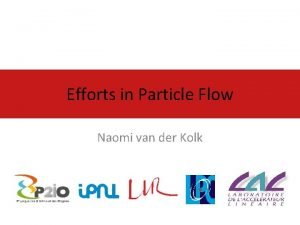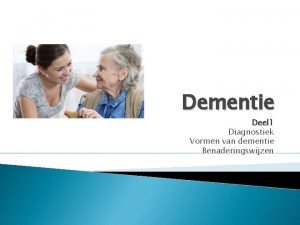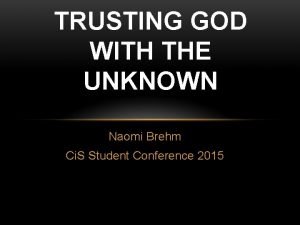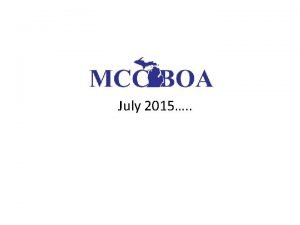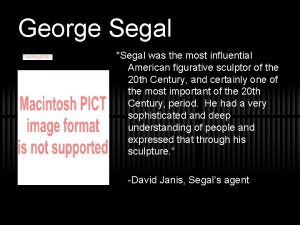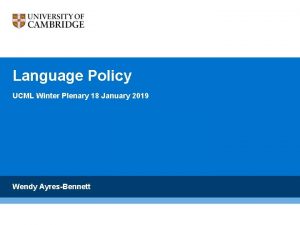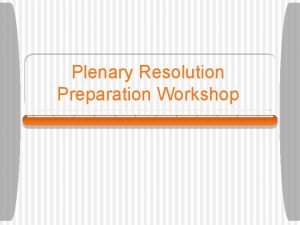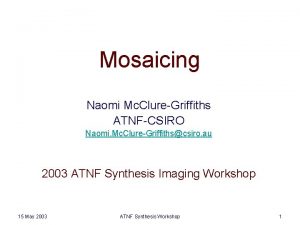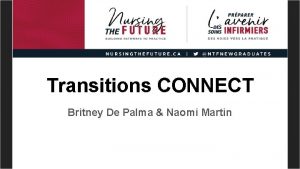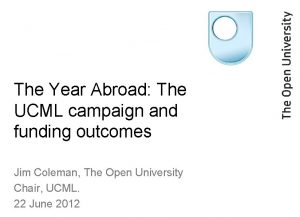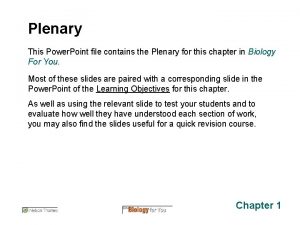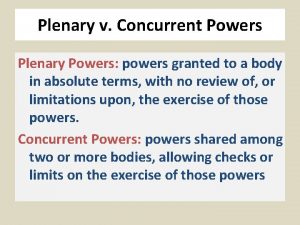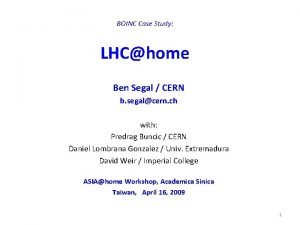Naomi Segal UCML PLENARY 3 JULY 2015 Survey
















































- Slides: 48

Naomi Segal UCML PLENARY 3 JULY 2015 Survey of the UCML membership on the conduct and outcomes of REF 2014

TO NOTE ØThere were 15 questions, many yes/no etc. , some free prose only. ØOut of 77 members of UCML (Depts/Schools & Subject Associations), 45 replies were received; among these v two responses each were received from 9 HEIs; v three responses were received from 1 HEI; …thus 34 HEIs are represented. ØOne reply represented both the respondent’s HEI and their Subject Association (Italian); this is presented as a case-study of a ‘smaller language’. This analysis includes all responses, in order to cover a range of views and reactions from the UCML membership. All responses are anonymised.

QUESTION A 1: At what level were the key decisions made in your HEI (Dept/School level; combined, higher)? TOTAL = 45 Dept/School = 7; Combined = 23; Higher = 15

COMMENTS ON QUESTION A. 1 The main decisions were initially taken at School level, but a close eye was kept on things at College level (ie Faculty group) & they intervened whenever they thought necessary. Very centralised institution. All key decisions are taken at the most senior level. Iteration between all 3 levels, with framework decisions made at PVC level and more detailed ones at Faculty level after a great deal of work at department level. The mock-REF was conducted university-wide but ‘submissions’ judged by two anonymous readers from within the Uo. A within the University. This produced ‘scores’ for each member of staff. Anyone on the borderline of inclusion had work re-read unless the reason for exclusion was quantity. The final decision for submission was taken by a panel at Faculty level equipped with all these data and with representation from outside the Faculty, too.

QUESTION A 2: Do you consider that REF 2014 was more or less successful than RAE 2008 in terms of process (complexity, time needed, structures in place, etc)? Total = 45 More = 26; Same = 8; Less = 11

QUESTION A 2: Do you consider that REF 2014 was more or less successful than RAE 2008 in terms of outcome? TOTAL = 45 More = 23; Same = 7; Less = 15

COMMENTS ON QUESTION A. 2 (1) Data was returned at school level (not individual units) and this made the process more cumbersome as well as less transparent. . A more strategic approach on the part of the institution to the submission of individuals and a systematic process of consultation and preparation (including a series of internal deadlines for drafting documentation and a system for reading and feedback across Uo. As), as well as early implementation of internal peer review of outputs, meant that we had a clearer sense of the logic and expectations of the REF and were better prepared for the final submission. Impact was of course the most problematic element and our institution struggled with that, though valiant efforts were made. The whole impact element added enormously to the burden of preparing the submission. It’s difficult to tell, because we were part of two different Uo. As, one of which contained researchers from three different departments. A lot of preparation was needed. Structures were not transparent. Interviews held were intimidating and unsatisfactory.

COMMENTS ON QUESTION A. 2 (2) Given the completely different structure of our UOA, the fact that we did well and managed to bring together many disparate strands, it felt like a successful outcome. We were altogether more professional and the result was correspondingly better. The more inclusive remit of Uo. A 28 meant that East Asian Studies and Translation & Interpreting could be included in the submission. Being reviewed as a larger unit makes even less sense than the RAE. My HEI commenced preparation of REF 2014 approximately 3 years in advance of the end of 2013. The criteria for the evaluation of outputs, etc, were still to be made public at this time. [University X] had always prided itself on a strong social commitment (‘civic university’) which helped when having to prepare in haste for the new impact factor.

QUESTION A 3: Are you concerned about funding outcomes? TOTAL = 45 Yes = 28; No = 17

COMMENTS ON QUESTION A. 3 (1) Total lack of clarity on how money will reach us (if at all). Same problem in 2008. The University has no transparency on this question. Our department was relatively successful in REF, and/but the challenges facing modern languages in terms of recruitment are such that the best we can hope for is to be protected. Funding is limited and departments with very different profiles are being compared in a competition for limited funds. To compare an institution that, say, focuses primarily on Celtic linguistics with an institution whose research covers modern European literatures and cultures is a faulty process. I am concerned about funding for the Humanities at a national level and the way in which the REF results will be used. And I am also concerned about institutions using this as a tool at local level for internal objectives. My impression is that the whole exercise was designed to provide grounds for cutting funding.

COMMENTS ON QUESTION A. 3 (2) Our University is small and we are concerned that, even though we have scored 3* and 4*, our funding will be cut because our submissions were smaller than in other institutions. Because the perception of the faculty is adversely affected within the institution. New and replacement posts are less likely to be released from above, further weakening the subject’s position. In terms of lesser funding available to results less than 4*, there is a concern. In terms of appropriate funding streams within the institution, reflecting the contribution of the Languages staff to other Uo. A submissions, less concern. This worked well in the previous round. In this institution there is no real link between the actual outcomes and the funding because it is so centralised. The result has already been for those departments perceived as ‘winners’ to mop up all the studentships and research resources whilst we as a department have got nothing, and I expect this to continue. Less for this exercise than for the next one.

QUESTION B 1: Was the change of panel structure a benefit? Total = 45 Yes = 22; No = 22; Don’t know = 1

COMMENTS ON QUESTION B. 1 (1: positive) The strengths of the departments that made up the Uo. A were complementary. Also, it saved staff time to have one submission rather than several. in a highly integrated School, we perhaps benefited from the new structure. The new panel structure meant that excellent researchers who happen to find themselves in not particularly strong language units were able to be submitted. It also reflected a lot of work that had gone into the creation of a single School (cross-language) research culture in the intervening period. There was greater confidence that it would recognise cross disciplinary work.

COMMENTS ON QUESTION B. 1 (2: negative) Small individual departments that did well in the RAE were forced to be part of a much larger group, so there was little sense of individual or departmental success. The size of the panel and the range of submissions meant that the league tables were basically meaningless. I think that you needed to have a large Linguistics department with you in order to do well, or at least European Studies. It makes it very difficult to interpret the results, as parallel departments at other institutions were submitted to completely different panels. The broader panels meant less, not more transparency and reliability. The definition of Uo. A 28 did not include East Asian Languages, which meant that our Chinese studies work was submitted to Uo. A 27. We did very well there in terms of outputs, but this resulted in us making two very small submissions, and doubled the work as far as documentation was concerned.

QUESTION B 2: Which sub-panel did you submit to? TOTAL = 44 28: MLL = 35. 5; 27 Area studies = 3. 5; Other = 5 Other = 29: English = 3 (2 wholes & 2 halves) 34: Art & Design = 1 (2 halves, both with English) 36: Communication, cultural & media studies = 1 (a whole)

QUESTION B 3: Did you sub-divide your submission? TOTAL = 45 Yes = 6; No = 38 The 6 yeses represent 3 HEIs, which each responded twice.

COMMENTS ON QUESTION B. 3 We were ʺUo. A 28 aʺ, including all European languages plus Celtic and Scottish Studies, but our submission was separate from Linguistics, because we have no research synergy with them. Our Linguistics department is in a separate School. Also, it is very high-powered, and didn’t necessarily want to be associated with us. Our Celtic Studies are very independent minded and insisted on being separate. Celtic Studies wanted to assert its separate identity and the HEI agreed; Linguistics went in with English. Welsh & Celtic Studies went in as a second 28 submission. The reasoning was that we really did not have any credible research activity in common.

QUESTION C 1: In your submission was there an institutional emphasis in choosing types of output (monographs, journal articles, chapters, etc) to submit? If Yes, what effect (if any) did this have on research planning at unit or researcher level? TOTAL = 45 Yes = 21; No = 24

COMMENTS ON QUESTION C. 1 (1: Yes) We were aware of the premium to be gained from monographs and an appropriate double-weighting strategy. We were aware too of the likelihood of rigorous peer-reviewed articles generating positive reviewer expectations. Colleagues were encouraged to prefer articles over book chapters. Where there was an overabundance of work to choose from monographs and journal articles were preferred, but it’s not as though there were a lot of people to whom this applied. There was some pressure in favour of monographs, and strong pressure towards ‘traditional outputs’ as a whole. The kind of work which is increasingly integral to large research grants (not just impact work, but creative and practice-led outputs) is not yet visible in REF terms. There was an emphasis on monographs and journal articles, which in retrospect seems to have paid off.

COMMENTS ON QUESTION C. 1 (2: No – or Yes, but…) Our HEI did not make the right decision re monographs. Double-weighting was semi ignored. Rightly, this is perceived to have been a mistake. Equally, if an individual’s monograph didn’t ‘fit’ with the Uo. A chosen for him/her to enter, then this was omitted regardless of quality considerations. Not as much effect as it should have done! An emphasis on monographs, following the History model and double-weighting. This did not adequately recognise high quality work in linguistics, which tends to be published in article form. There was no guidance about submissions. There was some pressure in favour of monographs, and strong pressure towards ‘traditional outputs’ as a whole. The kind of work which is increasingly integral to large research grants (not just impact work, but creative and practice-led outputs) is not yet visible in REF terms. The emphasis on monographs and journal articles discouraged us from doing valuable editing-related work and from contributing chapters to edited volumes.

QUESTION C 2: Did your submission use double-weighting? TOTAL = 45 Yes = 20; No = 24; Don’t know = 1

COMMENTS ON QUESTION C. 2 (1: Yes & Yes, but…) We only double-weighted those monographs that were considerable in length and/or of particular scholarly impact. It would be interesting to know how well those institutions that did use double weighting as a matter of course for all monographs did in the final outcome. Extremely successful double weighting policy operated – my understanding is that all cases bar one were accepted from our submission. Yes but relatively little. We felt that double-weighting should be applied only in exceptional cases. Feedback has suggested that we should perhaps have been more generous on this. We used some but clearly could have benefited more if we had used more.

COMMENTS ON QUESTION C. 2 (2: No) Double weighting was perceived by the institution as high risk. Consequently, virtually no outputs were proposed for double weighting. Very little. It did not seem to be a strategy that would benefit our submission to a great extent. We used very little double weighting on supposedly informed advice. Judging by the results and the feedback from the sub-panel, this was a mistake. Relatively little, because of anxiety about how the panel would receive this. There was discussion on this but it was eventually decided not to. We didn’t use it enough. We just doubleweighted two significant items. On reflection, we had some monographs (not all of those submitted by any means) which we ought to have double weighted. I think our result would have even better had we done so. Only felt it should be reserved for cast-iron 4* monographs, which we felt could not be guaranteed. . . This is a risk-averse institution.

QUESTION C 3: Were interdisciplinary outputs adequately catered for? TOTAL = 45 Yes = 30; No = 14; Don’t know = 1

COMMENTS ON QUESTION C. 3 Our whole submission was resolutely interdisciplinary and we were very successful. Many HEIs submitting to the panel did not highlight which outputs were interdisciplinary (as they were asked to) so the data published by HEFCE about the proportion of the work that was interdisciplinary are wrong. I thought that the possibility of cross-referral dealt with this, but I have since found out that relatively little work was cross-referred (to other panels) in fact. From what I am aware, there was not sufficient interdisciplinary expertise on the REF panel, and individual members had to read books from well outside their comfort zone. The broader remit of the panel meant that interdisciplinary outputs could be accommodated more easily. Not sure the ‘referral’ system to other panels really worked, since the quality of the interdisciplinarity itself was probably never given sufficient weight.

QUESTION D 1: Metrics may be used more in REF 2020 than in REF 2014. Are you concerned about this? TOTAL = 45 Yes = 41; No = 4

COMMENTS ON QUESTION D. 1 (1: negative) Peer review is at the core of the credibility of the REF in humanities and social sciences. If there is an attempt to apply metrics beyond things like external funding (which can be counted) the exercise would surely lose the trust of academics. I am deeply suspicious of all exercises that value numbers over qualitative evaluation. In Humanities research has a much longer lifespan than research in medicine and the sciences (and may hence be quoted more slowly/later); metrics can also be actively influenced by authors, e. g. by quoting themselves excessively, or pushing their name on social media. Therefore, while ostensibly more ‘objective’, metrics can actually hugely distort the picture. Metrics tell you nothing about research quality in Arts and Humanities subjects, as we have said repeatedly in consultations on this question! Quantitative measurements are not really suitable in large sections of the Humanities. Among other things, they are likely to favour further canonical areas as opposed to more ‘peripheral’ but also innovative work. Hard to see what metrics could be used that would be fit for purpose.

COMMENTS ON QUESTION D. 1 (2: a bit less negative) I don’t think the journals in Hispanic Studies and in other fields in which I publish will be ranked accurately. It is hard to include German journals in the ranking – they will fall down because of the language issue. A great many ML outputs (monographs and book chapters above all) are not commonly ‘captured’ by the software that produces metrics data. Many outputs are published in countries (and languages) where capturable data not assured (e. g. no ISBNs or ISSNs). There are few robust measures for research outputs in our field, though it is easier to measure inputs (funding, PGRs etc). Lack of clarity as to which citation indexes harvest monographs / publications in foreign / foreign-language journals. I see this as inevitable and in some ways it is helpful in terms of planning.

QUESTION D 2: Has the requirement of Open Access submission for journal articles already affected your Department/School’s research planning for REF 2020? TOTAL = 45 Yes = 31; No = 14

COMMENTS ON QUESTION D. 2 We have been given clear instructions on how to comply with open access rules. A pain, but not impossible to comply with. Several briefings about it. Now forms integral part of the School’s and University’s planning process. All researchers are obliged to submit anything ‘REFable’ immediately to the library for scrutiny whether it can be made open access and when. The University does not have enough money to pay for Gold Access and if it did pay for it, this would take substantial amounts of money away from actual research. We are providing information sessions and workshops and working with research mentors to provide appropriate advice to colleagues. . except insofar as we are encouraged to think about it. We’re obviously already trying to ensure that procedures are in place to comply with this. However, there is still a lack of clarity on a range of issues here. I wish it had. No strategy in sight.

QUESTION E 1: How would you describe the level of satisfaction and/or morale of your Department/School following the outcome of REF 2014? TOTAL = 44 10 High = 21; Mixed = 13; Low =

COMMENTS ON QUESTION E. 1 (1: positive) Very good as it was the last rebuilding block for a department that the university was two votes in senate away from closing in 2004. Absolutely fantastic – we achieved beyond our expectations. However, there are now high expectations at University level to achieve at this level again. This requires high investment in strategic and operational planning and, of course, career support and mentoring. Colleagues are aware of these high expectations. Morale was OK because even though we didn’t do brilliantly in UK terms, there was a distinct improvement from 2008 and the University acknowledged this. Very high. Basically good. Could be worse. . . We were very concerned on the evening of the announcement but the following afternoon I was able to report back to colleagues that the VC had looked me in the eye, smiled and said ‘hello’, which are three things which had not happened in the previous 4½ years. Overall the institution thought it had done well, which made him very happy.

COMMENTS ON QUESTION E. 1 (2: negative) Dissatisfaction with the levels of support provided by HEI, morale low in relation to a result that was not felt to reflect the level and quality of research going on in the department. Medium to low. It is felt that we were trying to second-guess the panel. When REF becomes an assessment not of research quality but of game-playing, then one has a system that is not entirely fit for purpose. Similarly, it is felt that a true assessment of a department’s research should have to include every single research-active member of staff. Morale was not high previously, and remains low. Ranges from neutral to very low indeed. Very low. It is generally felt that the REF has only a negative effect on a Faculty which is excellent but which focuses heavily on teaching as well as research. Disappointed in that a great deal of work by individuals (publishing, internal reviewing of others’ work) and by those in charge of our submission as a whole did not appear to bear fruit. And frustrated in that my HEI’s response to this ‘failure’ has been to create more red tape (and earlier in the REF timetable) for those individuals rather than scrutinising our institutional approach as a whole.

COMMENTS ON QUESTION E. 1 (3: mixed) Morale is noticeably better or worse; there is, if anything, a sense of weariness since we are already well engaged in preparations and planning for the next exercise. Given the scarcity of the QR monies themselves, the vast cost of the REF itself has raised many eyebrows. We did better than expected on impact and environment, and worse on outputs. This has led to much insecurity concerning our outputs and the reasons for their apparent lack of REF quality. Nonetheless, people feel the exercise was carried out as honestly and professionally as could be expected. We are broadly satisfied that we achieved a good outcome at the end of a process that was managed effectively and fairly. We have learned some lessons on how to approach future REFs. We remain baffled by the assessment of impact, but at least there are now models for effective practice in more successful Uo. As. Fairly bemused: the change of panel structure has meant that people feel quite distant from the results. Generally impact has been seen to be measured quite positively and wasn’t the disaster some colleagues had imagined. The bar is now set very high for publications and staff are feeling under increased pressure. There is a feeling that the ways in which we performed well did not correspond very well to our own sense of where our excellence lies.

‘Smaller languages’: ITALIAN STUDIES (1) It is hard to draw any conclusions or to tell any positive stories about research in Italian across the UK. Generic feedback from the panel was not helpful, in that it was bland descriptive (of the types of research being done in Italian Studies) and didn’t highlight areas of strength or weakness particularly. As a small language area nationally, the RAE had provided an important source of ‘success stories’ and examples of research excellence that could be shared. It’s harder to extract this information from the REF. In relation to Italian [within a HEI], the single Uo. A meant that the specificity of what we felt we brought to the overall picture as Italianists was lost in the larger Uo. A, and a very successful outcome in RAE 2008 (for Italian specifically) turned into a small part in a mediocre one in REF 2014. Italian has made a great deal of its very strong research culture (with RAE 2008 as ‘proof’ of that) over the last 7 years and we can no longer do this. I know that many other Italian units feel this quite strongly, as do other ‘minor’ language areas. Funding for research will no longer be allocated specifically to Italian, and for colleagues in some institutions this may be worrying. Where ‘schoolification’ has been most successful in creating a single research culture, spanning across languages, this impact should be less serious.

‘Smaller languages’: ITALIAN STUDIES (2) For Italian Studies there has been some anxiety about the almost total invisibility of Italian within the new Uo. A structure and we are keen to identify those areas of success that we can point to: around research grants, PG recruitment, and impact. Italian seems (but more work needs to be done on this) to be relatively strongly represented, relative to its size, in Uo. A 28’s impact case studies, although there has been little song-and-dance made of this so far. I understand the rationale behind the new Uo. A structure, and I believe that Modern Languages is stronger if it works as a single discipline. I would, however, like to plead for the following for 2020: • better subject-specific feedback (that is, if Italian is to be submitted as part of a single Uo. A then at least provide us with feedback that is useful to us as a subject body, rather than just telling us what we already know about the main areas of research in our subject); • more use of expert readers and cross-referral where necessary, especially in the case of smaller languages where there may only be a couple of experts on the panel to read everything.

Question E 2: feedback to HEFCE (1: Metrics & weighting) Please do not give in to metrics for REF 2020! And please reconsider weighting funding so that more is spread out across 3* and 2*, and not almost uniquely concentrated into 4*, which leads to serious imbalances internally and nationally. Make guidance about double-weighting much clearer. The exercise has been accepted by departments like mine because we had confidence in the way that outputs and impact statements were assessed. Using metrics would destroy that confidence. Don’t change the rules half-way– keep the parameters (level of weighting for factors etc. ) steady, at least for the next round. Don’t reduce the weighting for outputs to any less than 70% of the overall score. We agree with the suggestion that the outcome should be weighted in a ratio to your environment, ie that you should be credited with doing well in poor conditions.

Question E 2: feedback to HEFCE (2 a: Impact) In the Humanities, something that has wide impact often will be research that scores less well on a scholarly level. I am by no means opposed to Impact, but when pieces of work that score highly on impact are not even included in research submissions, because of perceived lack of scholarly quality, there is clearly a problem. The expectation that units submit a minimum of two impact case studies, regardless of the size of the submission, had a very negative effect. Merge the environment and impact templates. Impact was and is a negative element as it discourages certain kinds of valuable work and some of the best scholars within specialist fields in favour of dumbing down, celebrity culture, and the marketingminded. Research excellence should be judged by peer assessment of the quality of a scholar’s publications, no more and no less.

Question E 2: feedback to HEFCE (2 b: Impact) There are serious concerns about Impact (and my institution did relatively well on impact). The fact that there is a poor correlation in Panel D between scores in impact and scores in output (relative to other panels) suggests that there may be pressure to prioritize areas of academic work that privilege short-term gain. In general, there is little confidence that the impact scores are an accurate indicator of reality; they are exercises in creative story-telling. The impact agenda continues to baffle a great many of us. We really must lobby for the inclusion of wider kinds of ‘dissemination’ and ‘outreach’, rather than the very narrowly defined impact. The effect of limiting the number of submitted personnel by number of impact case studies led to ‘submittable’ staff not being submitted, at many institutions. The effect of this on staff morale – and thus on research productivity – should not be under-estimated. The Impact template duplicates a lot of information from the Environment template and impact case studies. It would be advisable to roll the two templates together. We hope that the decision on whether research publications included in impact case studies can be reused for qualitatively new case studies in REF 2020 is made soon and disseminated to universities in good time to help prepare impact case studies for REF 2020.

Question E 2: feedback to HEFCE (3: Preparation & process) The endless preparation of data, the incessant justification of one’s existence, are demoralizing and are leading to the loss of good lecturers. For HEFCE to be aware of the enormous amount of institutional time and resource that goes into REF. The effort involved in producing the submissions is now very considerable and is getting in the way of doing the research. Could you please resist the siren voices that want MORE detail to be included. Please retain peer-review at the heart of the process but streamline the processes required for submission. Too time-consuming, costly, and stressful for staff. Simplification of the process around which colleagues should get returned would be welcomed, so that time and energy isn’t spent agonising over this.

Question E 2: feedback to HEFCE (4: Panel structure) Do ensure proper coverage in areas where there is a high volume of research work. The absence of expertise in 19 c French studies (which is a major sub-field) was controversial. Our main points of concern are around: the inadequate range of expertise on the sub panel; the unexplained arrangements to separate out some units like Linguistics and Celtic Studies, which has a very distorting effect on the rankings; and some might feel that the impact agenda trivialises the process and rewards weaker research. I’d like to ask HEFCE to consider a separate panel for Linguistics, as it seems to me that this skewed the results on Uo. A 28 in many cases. HEFCE absolutely must redefine Uo. A 28 to explicitly include East Asian languages. The fact that it was not included disadvantaged many colleagues in the field and fragmented what were often already small submissions.

Question E 2: feedback to HEFCE (5: Feedback) Results should come back in the form of items + marks attained. It is absurd that we are left guessing which item scored what. Publishing outcome tables in the first instance that do not include research intensity seems perverse and adds an unnecessary layer of complexity and uncertainty to an already-complex process. If I were an undergraduate, I’d be frustrated at the lack of information available prior to submission of my work and at the lack of feedback on this following publication of the results. More feedback would be really helpful – to be able to improve, it needs to be clear what could be done better; otherwise a baddish performance is just demoralizing. More detailed feedback to Uo. As would be greatly appreciated. In some cases, feedback was too general to be useful. Statistical information that lumps ‘books’ and ‘parts of books’ into one category, with ‘journal articles’ in another, provides far too blunt feedback for our field, and for humanities in general.

Question E 2: feedback to HEFCE (6: Games-playing) It is depressing, but hardly surprising, that REF success continues to depend at least as much on HEIs’ capacity to plan and present their research submission strategically as to actually produce good quality research. Small institutions with limited resources for planning and assembling their submission (as opposed to its actual research content) operate at a clear disadvantage. Devise rules that prevent blatant game-playing by HEIs. It is an inordinately time-consuming game that is played at all levels within the institution. REF has now begun to drive research agendas, such that certain types of research are more valuable than others, and as we know discursively, theory and academic endeavour are also subject to taste, fashion and cultural norms; REF simply amplifies the weight of these in assessing what is ‘world-leading’ and what is not. The purported aims of this last reorganisation do not seem to me to have been achieved: gameplaying not only continued but was rewarded; HEFCE needs to reflect on what it wants to achieve and draw lessons from this last round.

Question E 2: feedback to HEFCE (7: Criteria) We need more clarity and stability about categories and criteria. And we need criteria which foster interdisciplinarity and innovation, rather than encouraging conservative approaches and field definitions. Impact was a problematic area of the return, in terms both of the clarity relating to criteria and the transparency of decisions taken. We would like to know what the real criteria are for grading publications. Since the Impact agenda was introduced to reward non-academic impact, it is hard to believe that the criteria will not be changed in due course to reward disciplines that have more non-academic impact than others. It is therefore very likely that the criteria will be tightened up very considerably next time, which will militate against our discipline.

Question E 2: feedback to HEFCE (8 a: Overall) Previous research assessment exercises had the positive effect of getting individuals and institutions focused on producing good research outputs. The introduction of impact into REF 2014 was also positive, in that it taught us to recognise the impact we have and think public engagement into our work for the future. The longer these formal exercises persist, the more they have the negative effect of distorting and constraining the research process and diverting staff time, and we can afford to ditch them. While HE managers in other countries seem to be eyeing up our assessment mechanisms, research academics are looking on in horror. Widest possible remit for a generalised Humanities submission, as this would allow all researchers to be included. The exercise has become far too bureaucratic, resource-consuming and unwieldy. Even with positive outcome the exercise does not seem to bring any positive results or support for research. Don’t waste the time and money doing it again!

Question E 2: feedback to HEFCE (8 b: Overall) I feel that the management of REF was an exercise in generating massive amounts of labour and anxiety within HEIs, sadly without much benefit to the stakeholders in terms of either income or reputation. The unevenness, even confusion, of the findings illustrates also the negative effect of creating assessment requirements such as impact and environment within a scheme that still lays stress on the monograph to the point of double-weighting it. Monographs only very rarely generate impact. I am not convinced that a true picture of a department or unit emerged from REF 2014, which begs the question of what purpose it serves. Don’t do it again. The time taken to produce results that are either predictable or skewed in ways that are also predictable at a different level is excessive. The stress is unnecessary. There are better ways of doing this. The exercise is absurdly bureaucratic & burdensome. Colleagues in the US and elsewhere in Europe profess astonishment and horror at what it involves, and at the implicit threat it constitutes to academic freedom.

Question E 3: Other comments… (1) The conflation of Linguistics and Literature/Cultural studies as ‘modern languages’ has led to a systemic outcome whereby Linguistics submissions occupy the top ranks, to the virtual exclusion of other submissions. This makes the results table meaningless or even misleading for those stakeholders who are reading ‘at face value’ (e. g. students home and overseas, parents, UCAS applicants). The top-ranked institutions (based on a linguistics submission) are sometimes institutions where there is little or no provision for undertaking study or research in modern languages. So, an outcomes table is not always meaningful in the public domain. More drilleddown calibration might have resolved some of the apparent discrepancies between the two cultures brought together in Uo. A 28. As it reads, it would appear that researchers in Linguistics are comprehensively stronger than their opposite numbers in modern language studies (literature, cultural studies etc. ). The range of impact case studies is a useful tool for making the case for the relevance and public benefit of Modern Language studies, and we should work to exploit these as much as possible. Since RAE/REF is now an institution, could we have a regular cycle, like the fixed-term parliaments?

Question E 3: Other comments… (2) We would emphasise that there needs to be a continued role for learned societies as a source of advice on panel constitution and other REF matters. UCML should complement this as a collective of such societies and languages departments/schools. I think all research-active members of staff should be required to submit an appropriate number of publications. While metrics are not the answer, some kind of slimmed-down process needs to be found for next time. There is said to be discussion about collectivizing outputs as well as impact. This would in effect probably produce a roughly similar outcome, but would very significantly reduce the burden on compiling the submission. My view is therefore that a move of this nature should be supported. We need a much more international perspective on this process. Not all countries are embarking on an ‘open access’ route. Equally, scholarship and ‘impact’ on the field/ ‘end users’/ educational pathways in different countries are also part of UK academics’ success stories.
 Eran segal
Eran segal Yaniv segal
Yaniv segal Eran segal
Eran segal George segal paintings
George segal paintings Sim segal
Sim segal Gojman y segal recorte
Gojman y segal recorte Onde naceu o pintor e escutor lasar segal
Onde naceu o pintor e escutor lasar segal Gallup employee engagement 2015
Gallup employee engagement 2015 Plenary power
Plenary power Preservation in the bible
Preservation in the bible Plenary pyramid
Plenary pyramid Plenary pyramid answer
Plenary pyramid answer Genitive case meaning
Genitive case meaning Plenary questions
Plenary questions 意識abcd
意識abcd Naomi radke
Naomi radke Stephen king fun facts
Stephen king fun facts Federanim
Federanim Naomi nagy
Naomi nagy Naomi burger
Naomi burger Naomi shihab nye “valentine for ernest mann”
Naomi shihab nye “valentine for ernest mann” Naomi weisstein
Naomi weisstein Mariah carey face shape
Mariah carey face shape Gmb bodies
Gmb bodies Material and information flow analysis
Material and information flow analysis Naomi jackson georgia
Naomi jackson georgia Making a fist meaning
Making a fist meaning Naomi rai
Naomi rai Dylan farros
Dylan farros Bad mouth betty
Bad mouth betty Naomi navarro
Naomi navarro Naomi penfold
Naomi penfold Naomi haynes
Naomi haynes Formation validation naomi feil
Formation validation naomi feil Naomi burnett
Naomi burnett Naomi conzo
Naomi conzo Pride magazine naomie harris analysis
Pride magazine naomie harris analysis Naomi niv
Naomi niv Naomi radke
Naomi radke Naomi latorraca
Naomi latorraca Scalenes
Scalenes Naomi noun
Naomi noun Ann steiner md
Ann steiner md Naomi kolk
Naomi kolk Naomi conzo
Naomi conzo Naomi chesler
Naomi chesler Naomi feil stadia dementie
Naomi feil stadia dementie Naomi brehm
Naomi brehm Naomi rai
Naomi rai
